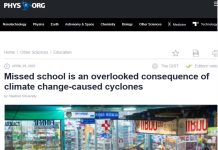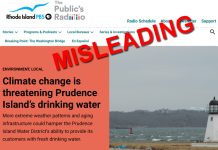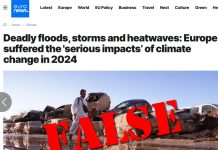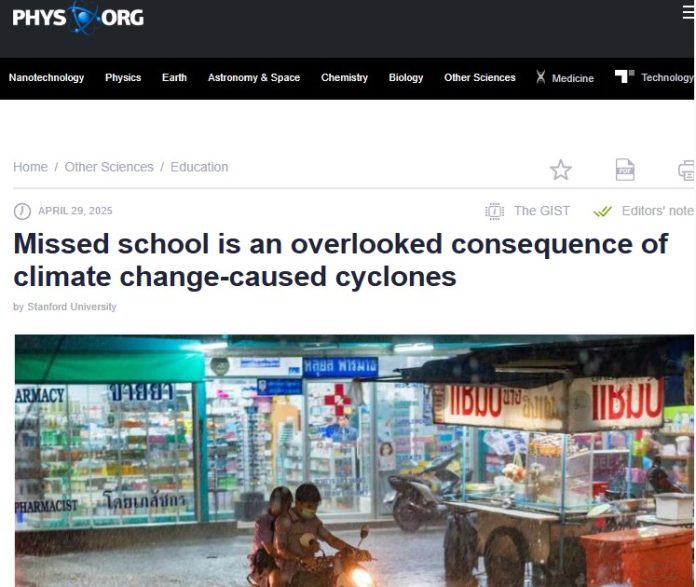In a recent editorial published by Phys.org, researchers claim that climate change is driving more powerful and frequent hurricanes, which in turn are causing widespread school closures labeling it an “overlooked consequence” of our supposedly worsening climate. This narrative is false. The available data shows no trend of increasing hurricane frequency or intensity due to human-induced climate change, and if the storms themselves aren’t worsening, the claim that they are causing more missed school days due to climate change collapses under its own weight.
The central claim that hurricanes are becoming more destructive and frequent due to climate change is contradicted by both long-term observational data and the official position of major scientific institutions.
According to the National Oceanic and Atmospheric Administration’s (NOAA) Geophysical Fluid Dynamics Laboratory (GFDL), there is no strong evidence of an increase in either the number or intensity of hurricanes globally due to human-caused climate change. In fact, NOAA writes:
“It is premature to conclude with high confidence that increasing atmospheric greenhouse gas concentrations have had a detectable impact on Atlantic basin hurricane activity.”
NOAA, while careful to attribute a “possible” increase in storm intensity in some basins, is consistent in stating that natural variability plays a dominant role in hurricane behavior, particularly in the Atlantic, where multidecadal oscillations—like the Atlantic Multidecadal Oscillation (AMO)—are primary drivers of activity.
Moreover, NOAA’s Historical Hurricane Tracks database reveals that the frequency of U.S. landfalling hurricanes has not increased over the past century. What’s more telling is that major hurricane (Category 3 and above) landfalls have remained steady or even declined slightly when viewed across long-term records. (See the figure, below)
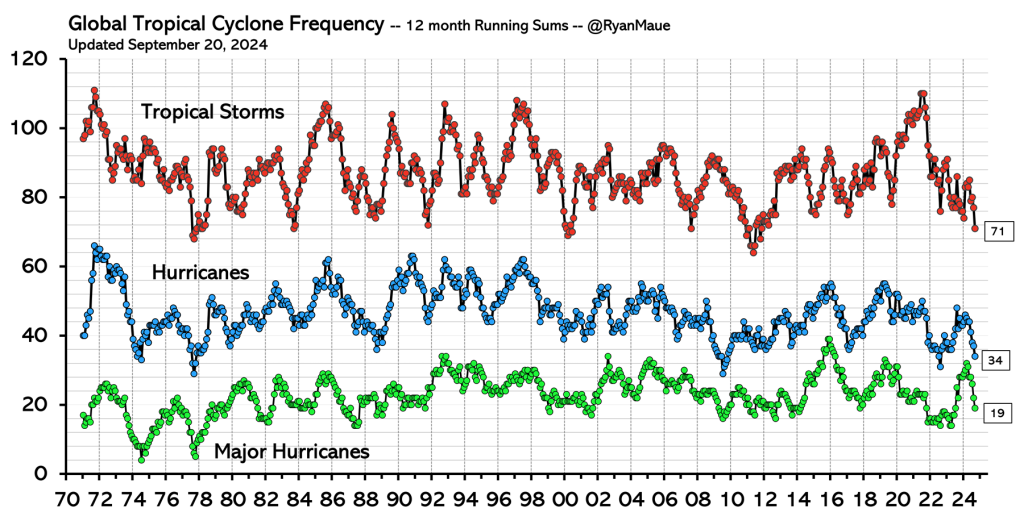
In fact, as Climate at a Glance: Hurricanes notes, 2005 to 2016 marked the longest stretch in U.S. history without a major hurricane making landfall, a record-shattering 11-year hiatus. If climate change were fueling more severe hurricanes impacting the USA, where were they hiding for over a decade?
Even the often-cited Intergovernmental Panel on Climate Change (IPCC) agrees. Their AR6 Working Group I report states there is “low confidence” in long-term (centennial-scale) increases in the frequency or intensity of hurricanes. That’s not a skeptical website talking—it’s the IPCC itself admitting the data doesn’t justify alarmism.
The authors of the Phys.org piece make the speculative leap from “climate-driven hurricanes” to “missed school days.” But their logic runs off the rails here. There’s no credible evidence that links climate change to educational disruptions. Even if storm-related school closures are increasing in some areas, the cause is due to shifts in administrative policy, liability concerns, and enhanced emergency response protocols, rather than more intense weather.
Schools today have better warning systems in place for inclement weather and are quicker to close as a precaution than they were 20 or 30 years ago. In decades past, a Category 1 hurricane approaching the coast would maybe result in a weather warning; today it often leads to multi-day shutdowns, even in regions that escape the brunt of the storm. That change reflects institutional behavior—not climatological shifts.
Hurricanes have always disrupted coastal life, but because there is no evidence hurricane numbers or intensity have increased during the recent period of slight warming, it is impossible to attribute any increase in school closures to climate change induced hurricanes.
This article is a textbook example of shoddy research dressed up as urgent policy insight. By stretching an already weak climate claim—about worsening cyclones—into an even more tenuous social consequence—missed school days—it commits the cardinal sin of science: drawing sweeping conclusions from flimsy, cherry-picked evidence. There is no measurable increase in hurricane strength or frequency. Therefore, there is no climate change driven crisis of school disruption. The authors of this editorial should get an “F” in climate literacy— for failing the scientific smell test. Readers deserve better than this kind of unsupported alarmism.


